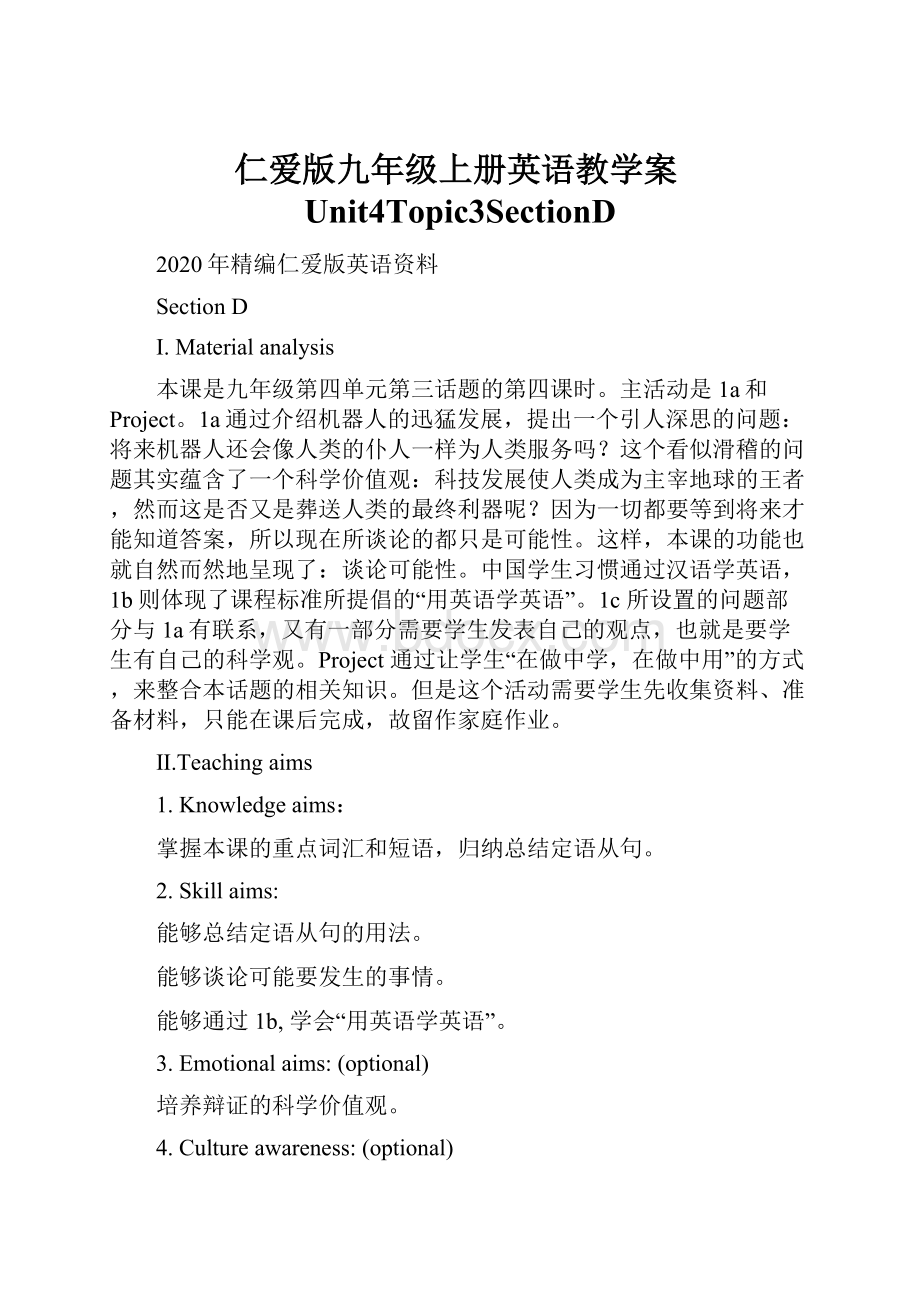仁爱版九年级上册英语教学案Unit4Topic3SectionD.docx
《仁爱版九年级上册英语教学案Unit4Topic3SectionD.docx》由会员分享,可在线阅读,更多相关《仁爱版九年级上册英语教学案Unit4Topic3SectionD.docx(15页珍藏版)》请在冰豆网上搜索。

仁爱版九年级上册英语教学案Unit4Topic3SectionD
2020年精编仁爱版英语资料
SectionD
Ⅰ.Materialanalysis
本课是九年级第四单元第三话题的第四课时。
主活动是1a和Project。
1a通过介绍机器人的迅猛发展,提出一个引人深思的问题:
将来机器人还会像人类的仆人一样为人类服务吗?
这个看似滑稽的问题其实蕴含了一个科学价值观:
科技发展使人类成为主宰地球的王者,然而这是否又是葬送人类的最终利器呢?
因为一切都要等到将来才能知道答案,所以现在所谈论的都只是可能性。
这样,本课的功能也就自然而然地呈现了:
谈论可能性。
中国学生习惯通过汉语学英语,1b则体现了课程标准所提倡的“用英语学英语”。
1c所设置的问题部分与1a有联系,又有一部分需要学生发表自己的观点,也就是要学生有自己的科学观。
Project通过让学生“在做中学,在做中用”的方式,来整合本话题的相关知识。
但是这个活动需要学生先收集资料、准备材料,只能在课后完成,故留作家庭作业。
Ⅱ.Teachingaims
1.Knowledgeaims:
掌握本课的重点词汇和短语,归纳总结定语从句。
2.Skillaims:
能够总结定语从句的用法。
能够谈论可能要发生的事情。
能够通过1b,学会“用英语学英语”。
3.Emotionalaims:
(optional)
培养辩证的科学价值观。
4.Cultureawareness:
(optional)
Ⅲ.Thekeypointsanddifficultpoints
1.Keypoints:
Wordsandphrases:
certain,forcertain,onone’sown,warn,might,housework,sofar,besurprisedat,nolonger
Sentences:
Nooneknowsforcertain,butmostpeoplethinkthatrobotswillbepartofourlives.
Inafewyears,perhapsrobotswillthinkontheirown,justaspeopleusetheirbrainsandactforthemselves.
Onescientistwarnsthatifrobotsstarttothinkforthemselves,theywillnolongerwanttobeourservants,butourmasters.
Grammar:
summarizetheattributiveclause,talkaboutpossibilities
2.Difficultpoints:
Thescientistalsowarnsthatifwearelucky,theymighttreatusaswenowtreatourpets.
Perhapstherewillbeawarbetweenhumanbeingsandrobots.
Inafewyears,perhapsrobotswillthinkontheirown,justaspeopleusetheirbrainsandactforthemselves.
However,oncerobotscanthinkforthemselves,problemsmayappear.
Ⅳ.Learningstrategies
在“语法和功能”部分,通过和老师同学一起总结定语从句的用法,来整理本话题的语法。
通过讨论pre-reading的问题,预测文章的内容。
在1b,尝试用英语释义来学习英语单词。
通过Project,在合作的过程中学习制作英语墙报。
Ⅴ.Teachingaids
各种机器人的图片/做墙报用的8开的纸/彩笔/一本英英词典/ppt等。
Ⅵ.Teachingprocedures
Stage
(timeperiod)
Interaction
patterns
Teacheractivity
Studentactivity
Remarks
1
Revision
(8mins)
Classactivity
EncouragetheSsreadouttheirHMKwhichwasassignedinSectionC.
T:
Hi,boysandgirls,happytoseeyouagain.Haveyoufinishedyourhomework?
T:
Whowouldliketoshareyourpassage?
Howaboutyou,xxx?
T:
Wow!
Whatwonderfulimagination!
Anotherone?
ReadouttheirHMKwhichwasassignedinSectionC.
Ss:
Yes.
S1:
Allright.
OneDayWithoutComputers
ItwasthemostboringdayIspenttoday.Iwokeupateightinthemorning.ThenIwasreadytohavemybreakfast.Butthecomputercontrolledcookerdidn’twork.Isentamessagetomydriver—therobot.Buthedidn’tcome.SoIhadtowalktotheworkplace.WhenIgotthere,therewasabigcrowd.Thedoorcouldn’topenasusual.Theytoldmethatthecomputerwhichcontrolledthedoorwasbroken.Nobodycouldgointotheroom.ThenIwenttosupermarkettobuysomefood.It’sclosed,too.Thenotesaidthecomputerdidn’twork.Idecidedtogohome.Isaid“OpenSesame”tothedoor.Oh,mygod!
Itdidn’twork.Atlast,Ispentthewholedaywalkingalongthestreet!
Untileightintheevening,everythingcamebacktolife.WhatabaddayIhad!
S2:
…
S3:
…
这种幻想式的作文很有趣,可以让学生把他们的作品贴在教室的“英语园地”中。
2
Gettingstudentsreadyforlearning
(3mins)
Classactivity
Presentallkindsofpicturesofrobotstogiveabriefintroductiontorobots.
T:
Hi,class.Lookatthisstrangething.Whatdoyouthinkitis?
T:
No.It’snotatank.It’sarobot.It’sthefirstrobotintheworld.ItwasinventedbyEngelberger.Hewascalled“Thefatherofrobots”.
T:
Look!
Therearemanypicturesofrobots.
T:
Youcanseerobotshavechangedalotinshapes.Today,wewilllearnaboutrobots.
Learnsomethingaboutrobots.
S1:
坦克。
最好能够根据机器人的发展历程来展示各种机器人。
3
Pre-reading
(5mins)
Groupwork
LettheSsdiscussingroupsthequestionsin1atowarmup.
T:
Beforewebeginthenewlesson,I’dlikeyoutodiscussthequestionsin1afirst.Ifyoufinish,raiseyourhand.
T:
Whatareyouropinions,Group4?
T:
Whatalazyboy!
Totellthetruth,Ialsowantarobottodohouseworkforme,haha!
IfIhavearobot,itcandoallthehouseworkforme,likemyservant.Howaboutyou,Group1?
T:
Iagreewithyou.Ifyouwanttoknowmoreaboutrobots,justread1a.
Discussingroupsthequestionsin1atowarmup.
S1:
Wealllikerobots.xxxsayshewouldlikearobottodohomeworkforhim.
S2:
Welikerobots,too.Theyaretoohelpfulinourdailylife.
S3:
…
S4:
…
老师要适时讲解部分生词。
如:
house+work=housework,serv(serve)+ant(…的人)=servant。
4
While-reading
(5mins)
Individualwork
LettheSsread1aanddo1b.Checktheanswers.
T:
Next,youwillread1a.Butbeforereading,pleaseread1b.Youhavetofindthewordsinthepassageaccordingtothemeaningsandthefirstletter.Whenyoufinish,putupyourhand.
T:
Hi,boysandgirls!
Whocantelluswhatthefirstwordis?
Howaboutyou,xxx?
T:
Itdoesn’tmatter.Pleasespellit.
T:
Yes,youareright.Followme,everyone.“warn”.
T:
Weusuallyuseitthisway:
“warnsb.nottodosth.”or“sb.warnsthat…”Thesecondone?
T:
…
Read1aanddo1b.Checktheanswers.
S1:
Sorry,Idon’tknowhowtopronounceit.
S1:
W-A-R-N
Ss:
warn
S2:
cause
S3:
…
S4:
…
尽管学生没学过“warn”,但通过英语解释,能知道第一个单词的意思是“警告”,然后再回到短文去寻找哪个单词可能是这个意思。
这就是要培养学生“用英语学英语”的能力。
老师可以利用这个环节来让学生学习新词:
warn,certain,servant。
5
Post-reading
(15mins)
Groupwork
Individualwork
Step1:
LettheSsread1aagainandthendiscussthequestionsin1cingroups.
T:
Now,youwillread1aagain.However,youshouldreadthequestionsin1cfirst.Afterreading,pleasediscussthequestionsingroups.Ifyoufinishyourdiscussion,pleaseletmeknow.
T:
WhatareyouropinionsaboutQuestion1,Group3?
T:
Great!
Eachgrouphasdifferentideas.Robotsareconsideredtobeourservants,aren’tthey?
T:
Ihopeso.Doyouthinkrobotscanthinkoractforthemselves?
T:
Itseemsthatyouhaveadeepdiscussion.Howaboutthelastquestion?
T:
Iagreewithyou.Thepassageisjusttalkingaboutpossibilities.Doyouknowwhichwordsareusuallyusedtotalkaboutpossibilities?
T:
“May”and“Might”.
Step2:
LettheSsread1athethirdtimetofindouttheusefulexpressionsandthesentenceswhichexpresspossibilities.
T:
Youhavelearnedhowtotalkaboutpossibilities.Now,read1athethirdtimetofindoutthesentenceswhichexpresspossibilitiesandusefulexpressions.Ifyoufinish,putupyourhand.
T:
Now,let’scheckthesentencestogether.Thefirstoneis…
T:
Thesecondoneis…
T:
…
T:
Thoughthepassageisjusttalkingaboutpossibilities,fromthispassage,weknowsciencemaybenotalwaysgoodforus.Perhapsitwilldoharmtohumanbeingsinthefuture.
T:
Haveyoufoundanyusefulexpressions?
Read1aagainandthendiscussthequestionsin1cingroups.
S1:
Wethinkrobotswillbepartofourlivesinthefuture.Becausecomputer
scienceandrobottechnologywillmakeeverythingpossible.
S2:
Wethinkrobotswillplayimportantpartinmanyareasofwork,especiallyinfactories.
S3:
Wethinkrobotswillbepartofourlives,buttheywon’ttaketheplaceofhumanbeings.
S4:
…
S5:
…
S6:
Wethinktheyare.
S7:
Wedon’tthinkso.Theyaremachinesonly.Theydon’thavetheirownbrains.
S8:
Perhapsitispossible.Humanbeingsaretooclever.Theycanmakeimpossiblethingspossible.
S9:
Becauserobotsmaybecomemastersofthehumanbeings.
S10:
Becausewearenotsure,itisaquestion.
S10:
Perhaps,probably
S11:
maybe
Read1athethirdtimetofindouttheusefulexpressionsandthesentenceswhichexpresspossibilities.
Ss:
Perhapsrobotswillthinkontheirown,…
Ss:
However,oncerobots…mayappear.
Ss:
…
S1:
forcertain,sofar,..
S2:
besurprisedat,onone’sown,…
S3:
nolonger,between…and…
让学生在重读1a之前,先读1c的问题,带着问题去阅读,有利于提高学生的阅读效率。
老师要在学生回答第4个问题时,顺势点明:
文章所讲的只是可能性。
并指出本话题的目的之一就是要谈论可能性。
通常用这些词来表达可能性:
perhaps,probably,maybe,may,might。
6
Summarizingandassigninghomework(9mins)
Classactivity
Classactivity
Step1:
LettheSsreadthesentencesinGrammarandFunctionstogether.
T:
Wehavefinishedthistopic.It’stimetosumup.First,readthesentencesinGrammarandFunctionstogether.Ready?
Go!
Step2:
LettheSssumupthegrammar.
T:
Now,let’ssumupthegrammarandexpressions.What’sthegrammarforthistopic?
T:
Yes.Whatelse?
T:
Right.xxx,canyousaysomethingaboutattributiveclause?
T:
Soundsgreat!
Whowantstoaddmore?
T:
Welldone.Howaboutpossibilities?
T:
Howwonderful!
Step3:
HMK
T:
Iknowyouaregoodatmakingwallnewspapers.ButI’mnotsurewhetheryouaregoodatmakingEnglishwallnewspapers,too.Today,you’llhavethechancetoshowyourtalent.Afterclass,pleaseworkingroupstomakeanEnglishwallnewspaperaccordingtotherequirementsinProject.Wewillchoosethebestoneandgivethisgrouppresents.AllyournewspaperswillbeputupontheEnglishCorner.
ReadthesentencesinGrammarandFunctionstogether.
Ss:
…
Sumupthegrammar.
Ss:
定语从句。
S1:
还有谈论可能性。
S2:
定语从句常用的关系代词有:
who,which,that.Who用于指人,which用于指物,that既可以指人,也可以指物。
S3:
从句中的谓语动词要和先行词的数保持一致。
S4:
常用maybe,may,might,perhaps,probably来谈论可能性。
学生喜欢竞争,渴望得到认可。
所以老师要强调:
墙报做得好的小组将得到礼物。
其余也要张贴到“英语角”,这样每个小组都会认真对待这个任务。
Ⅶ.Blackboarddesign
Chinaisthethirdnationthatsentapersonintospace.
SectionD
Wordsandphrases:
certain
forcertain
onone’sown
warn
might(may)
house+work=housework
Grammar:
attributiveclause:
定语从句
relativepronouns:
关系代词
antecedents:
先行词
当先行词指人时,关系代词用“who/that”;
当先行词指物体时,关系代词用“which/that”。
关系代词在从句中的成分:
主语,宾语
关系代词的省略:
在从句中作宾语时
Possibilities:
may
might
perhaps
probably
maybe
Sentences:
Thescientistalsowarnsthatifwearelucky,theymighttreatusaswenowtreatourpets.
Perhapstherewillbeawarbetweenhumanbeingsandrobots.
Inafewyears,perhapsrobotswillthinkontheirown,justasp